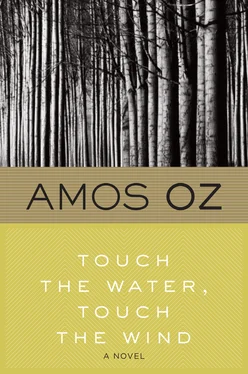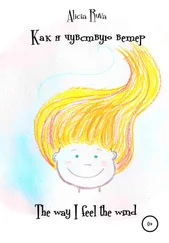And now:
A girl, in the distance, almost a child, running, her hair struggling in the wind, perhaps crying silently, yes crying silently, running, clutching something, the distance and the gray light make it impossible to tell what, she trips, stumbles, falls flat, springs up again at once, surely panting, running, surely desperate, running toward the glimmering hills on the farthest horizon, too late, hopeless, running—
The whole scene is ruthlessly dominated by the reek of wet hay, the stench of rotting fish, and a damp noxious vapor rising from the stream.
In a pool of mire stands a thin man leaning on one crutch, and Stefa watches wide-eyed as he brandishes the other furiously at the forest, at the sky, curses, describes intricate arabesques in the air, crosses himself fervently, wheels round, drops both crutches, and collapses into the mire.
Finally the rain comes:
Fine and piercing, whispering on damp hovels, scratching at their roofs, gently lashed by the northerly wind. Gradually the hills darken, straining wearily toward the water. A distant train lets out a shriek of honor. There is no bird here. Not even a raven.
And the Polish forest all around, ceaselessly hissing.
One Friday afternoon, after the end of the week's work and at the onset of twilight, when the air was full of recorder music from the children's houses and a smell of rain wafted among the small whitewashed buildings, Ernst, the Secretary, came to Pomeranz's room, accompanied by two middle-aged women. This time they came not with axes, mercifully, not with sneezing-powder, but with flowers. The middle-aged women thrust a graceful bunch of blazing yellow chrysanthemums into a vase. Their hands were thick-veined and weary.
"Shabbat Shalom," said Ernst.
"Shabbat Shalom and good evening," said the middle-aged women.
Pomeranz said:
"And the same to you. Won't you sit down?"
Ernst was a heavily built man in his sixties, with rather sagging features which inspired trust and friendship, yet whose expression did not try to conceal the doubts, the caution which were the fruit of disappointments and troubling experiences. Ernst also had remarkably thick gray eyebrows, one of which— the left one — was always slightly raised: Ernst was really amazed at you — how on earth could you have done such a thing to him. He was a man of experience, he would not waste words, he would merely raise one eyebrow in amazement and you, rebuked and embarrassed, would start apologizing incoherently in an attempt to placate that one raised eyebrow. In vain.
Ernst produced a small greeting card in a white envelope and put it on the table, under the vase. Then, in a slow, measured voice, he said:
"We have come on our own behalf and on behalf of the whole kibbutz family."
Meanwhile the stray dog, the fox, watched from the corner of the room with quivering nostrils and sad veiled eyes. This creature was the terror of the children; he was almost always panting and growling, sometimes breaking out into a loud howl, he was virtually incapable of producing an honest bark, his drooping fur was a sickly gray. He looked like a stuffed dog.
Dziobak Przywolski, fresh and lively, just out of the shower and wearing a brown dressing-gown, his jowl radiating a smell of shaving and towels, acknowledged the Secretary's opening gambit with a nod of the chin. He indicated a pair of chairs and an armchair. When his visitors were seated, he straightened the tablecloth and smoothed a slight crease in the bedspread. He was short and agile. There was not the slightest sign to be detected anywhere in the room of discoveries or inventions. There were a few volumes in English and German. Ernst squinted at them for a moment, as if their bindings might betray a clue to some misdemeanor which took place here when there was no one about to watch. Pomeranz picked up the envelope, opened it, briefly scanned the message — congratulations from the whole kibbutz family, your joy is our joy, on to ever greater things in the future — and broke his silence to ask:
"What joy?"
They said:
"The whole world is buzzing. Yesterday and this morning they were filming the life of the kibbutz."
And they said:
"Such a discovery brings enormous benefit to the State of Israel."
Pomeranz said nothing.
The guests found nothing to add, either.
There was a slight embarrassment, silence, an effort to smile.
Pomeranz carefully selected an orange, and opening the desk drawer on which his visitors' eyes were expectantly fixed he took out a knife, described an almost perfect circle at the top end and cut six amazingly precise lines of longitude down to the South Pole, where they all unerringly converged. After this performance the orange apparently peeled itself, in accordance with six slight hints. He opened it, carefully removed the pith, separated the segments, arranged them symmetrically on a glass plate as if bent on adding a chrysanthemum of his own to the bunch in the vase, and proffered it to his guests.
Ernst thanked him. The middle-aged women thanked him. Each of them took a segment, in order, from left to right. Pomeranz helped himself to one, following the same order.
Then one of the middle-aged women summoned up her resolution and spoke. She wanted to know, or at least to understand, how one could discover something scientific without test tubes, without flasks and retorts, at least some sort of equipment, without any… surely scientists always worked in special laboratories, she had once visited her nephew at the Weizmann Institute and she had seen, everybody there was wearing white coats, and anyway, surely…
Suddenly, in the middle of her question, she was struck by a thought. She decided to stop.
Pomeranz switched on the table lamp; the shadows were stirred up for a moment, and then regained their balance. And settled down. How calm the room was. How soft the tones of the curtains. The rug, two well-defined, simple colors. The patient bookshelves. The table. The four matching chairs. The single armchair. No ornaments or pictures. And in the corner facing the window another vase, a large tall one with some pine branches in it. Beside the door another low table, with the tea and coffee things on it. The gray bedspread. A slight quivering movement underneath it: the tip of the doglike creature's snout.
At the end of the silence, Ernst decided to light his pipe and come to the point. Well then, apart from congratulations and celebration there were also a few practical matters which it would be as well to talk over at some opportune moment, and in fact why not at this moment, which was in no way less opportune than any other. So. That morning the Farming Committee had debated the subject. It had been decided, on a motion proposed by Vera and carried unanimously, that young Shaulik, Yehuda Yatom's son, should be transferred to the sheep as from next week, so as to replace Elisha — at least part of the time, at this stage — and leave him free to devote two or possibly three mornings a week to his scientific researches.
Then Ernst put a question. Wreathed in tobacco smoke, slightly suspicious, looking like a man who feels a sudden slight pain. He wished to know if there was any kind of help the kibbutz could offer.
And raising his left eyebrow he explained:
"Material or otherwise."
Pomeranz summoned up words. He was grateful for their kind attention, he was grateful for their good will, he was grateful for all their greetings. No, for the moment he could not think of anything he needed. But perhaps they would permit him to think it over for a day or two. Springtime was approaching, the sky was brightening, something might change at any moment.
The Secretary, after a minute's reflection, offered another proposal. He hesitated to put the question, he would have liked to be more certain of the answer first, but how would Elisha feel about the idea of giving a lecture to the other members about his discovery. Not, of course, a fully detailed, scholarly exposition, there was no need for the whole apparatus, but perhaps just a general, popular explanation, so that they would all know what it was about. In the broadest of outlines, naturally. After all, for most of the members modem science was more or less a new form of hieroglyphics. Would he let them have, how should he put it, a very general impression, enough to satisfy their curiosity? Let's say: the background, the usefulness, the motives, the results, when and where the idea had first come to him, the potential contribution of the discovery, in short — an explanation. What all the fuss was about. What the point of it was.
Читать дальше

![Хироми Каваками - Strange Weather in Tokyo [= The Briefcase]](/books/29150/hiromi-kavakami-strange-weather-in-tokyo-the-br-thumb.webp)










